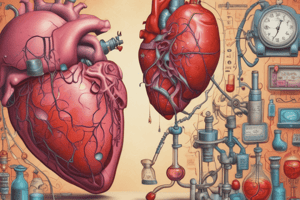Podcast
Questions and Answers
What does pharmacodynamics primarily study?
What does pharmacodynamics primarily study?
- Drug excretion processes
- The classification of drug types
- How drugs affect the body (correct)
- The rates of drug absorption
Which of the following processes is primarily responsible for the breakdown of drugs in the liver?
Which of the following processes is primarily responsible for the breakdown of drugs in the liver?
- Distribution
- Metabolism (correct)
- Absorption
- Excretion
What is the role of agonists in pharmacology?
What is the role of agonists in pharmacology?
- They enhance drug metabolism
- They cause adverse reactions
- They block receptors
- They activate receptors (correct)
Which of the following is a major aspect monitored by regulatory agencies like the FDA?
Which of the following is a major aspect monitored by regulatory agencies like the FDA?
What type of drug interaction occurs when one drug alters the effectiveness of another?
What type of drug interaction occurs when one drug alters the effectiveness of another?
What is the purpose of pharmacogenomics in medicine?
What is the purpose of pharmacogenomics in medicine?
Which of the following is NOT a type of adverse drug reaction (ADR)?
Which of the following is NOT a type of adverse drug reaction (ADR)?
Which stage is NOT part of the drug development process?
Which stage is NOT part of the drug development process?
Flashcards are hidden until you start studying
Study Notes
Pharmacology
-
Definition:
- The branch of medicine and biology concerned with drug action, including how drugs interact with biological systems.
-
Key Concepts:
-
Pharmacodynamics:
- Study of how drugs affect the body.
- Key terms: agonists (activate receptors), antagonists (block receptors), dose-response relationship.
-
Pharmacokinetics:
- Study of how the body absorbs, distributes, metabolizes, and excretes drugs.
- Key processes:
- Absorption: How drug enters the bloodstream.
- Distribution: Dispersion of drug throughout the body.
- Metabolism: Biochemical modification of drugs, primarily in the liver.
- Excretion: Removal of drugs from the body, mainly through kidneys.
-
-
Drug Classification:
- Therapeutic Classification: Based on the therapeutic effect (e.g., analgesics, antibiotics).
- Mechanism of Action: How a drug produces its effect (e.g., enzyme inhibitors, receptor activators).
-
Drug Development:
- Stages include discovery, preclinical testing, clinical trials, and regulatory approval.
- Emphasis on safety, efficacy, and quality.
-
Regulatory Aspects:
- Agencies (e.g., FDA, EMA) oversee drug approval and monitoring.
- Importance of clinical trials for new medications.
-
Adverse Drug Reactions (ADRs):
- Unintended effects that occur at normal doses.
- Types:
- Allergic reactions
- Idiosyncratic reactions (rare, unpredictable)
- Dose-related toxic effects
-
Drug Interactions:
- Occur when the effect of one drug is altered by another.
- Types include:
- Drug-drug interactions
- Drug-food interactions
- Drug-disease interactions
-
Pharmacogenomics:
- Study of how genes affect individual responses to drugs.
- Aim to personalize medication based on genetic profiles.
-
Clinical Pharmacology:
- Application of pharmacological principles in clinical settings.
- Focus on optimizing drug therapy for patient care.
-
Ethical Considerations:
- Informed consent in clinical trials.
- Importance of patient safety and ethical prescribing practices.
Pharmacology Overview
- Branch of medicine and biology focused on drug action and interactions with biological systems.
Key Concepts in Pharmacology
-
Pharmacodynamics:
- Examines the effects of drugs on the body.
- Key terms include:
- Agonists: Substances that activate receptors.
- Antagonists: Substances that block receptors.
- Dose-response relationship: Relationship between drug dosage and its effect.
-
Pharmacokinetics:
- Analyzes how the body handles drugs across four main processes:
- Absorption: The process of a drug entering the bloodstream.
- Distribution: How the drug disperses throughout the body.
- Metabolism: The biochemical alteration of drugs, predominantly in the liver.
- Excretion: The elimination of drugs from the body primarily via the kidneys.
- Analyzes how the body handles drugs across four main processes:
Drug Classification
- Therapeutic Classification: Categorization based on the therapeutic effects of drugs (e.g., analgesics, antibiotics).
- Mechanism of Action: Describes how drugs produce their effects (e.g., enzyme inhibitors, receptor activators).
Drug Development Process
- Involves several stages: discovery, preclinical testing, clinical trials, and regulatory approval.
- Prioritizes safety, efficacy, and quality assurance in new medications.
Regulatory Aspects
- Agencies like the FDA and EMA are responsible for drug approval and monitoring.
- Emphasizes the vital role of clinical trials in the medication development process.
Adverse Drug Reactions (ADRs)
- Unintended effects that arise at normal drug doses, including:
- Allergic reactions: Immune response to a drug.
- Idiosyncratic reactions: Rare and unpredictable responses.
- Dose-related toxic effects: Adverse effects related to the dosage.
Drug Interactions
- Occur when one drug’s effect is influenced by another substance.
- Types include:
- Drug-drug interactions: Effects altered by another drug.
- Drug-food interactions: Effects modified by food consumption.
- Drug-disease interactions: Effects influenced by the presence of other diseases.
Pharmacogenomics
- Examines how genetic variability affects individual drug responses.
- Aims to personalize medication based on a patient's genetic make-up.
Clinical Pharmacology
- Application of pharmacological principles in healthcare settings.
- Focuses on optimizing drug therapies for improved patient outcomes.
Ethical Considerations in Pharmacology
- Informed consent is essential in all clinical trials.
- Prioritizes patient safety and ethical practices in drug prescribing.
Studying That Suits You
Use AI to generate personalized quizzes and flashcards to suit your learning preferences.




